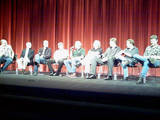 Garfeimao writes: The Academy of Motion Pictures, Arts and Sciences has been doing a film series called “Great to be Nominated” which features the film from each year that received the most nominations while not winning one of the major awards. So, 2002 was Fellowship of the Ring, which did win 4 Academy Awards, but none of them in the major categories. The host did mention that the filmmakers were in the unique position of re-dressing that issue 2 years later, when Return of the King won all 11 awards it was nominated for.
Garfeimao writes: The Academy of Motion Pictures, Arts and Sciences has been doing a film series called “Great to be Nominated” which features the film from each year that received the most nominations while not winning one of the major awards. So, 2002 was Fellowship of the Ring, which did win 4 Academy Awards, but none of them in the major categories. The host did mention that the filmmakers were in the unique position of re-dressing that issue 2 years later, when Return of the King won all 11 awards it was nominated for.
Anyhow, the Samuel Goldwyn theater at the Academy is a wonderful room to see a film in. It’s just tops in screen and sound, which makes sense, since it’s an Industry venue. Seeing Fellowship again on the big screen was magical, you pick up on so many details you miss watching it at home. And the sound was amazing, I heard background dialogue I’d never heard before, and I’ve seen the film, well, more than a few times. 😉 Having the Orcs completely surround you, auditorily, was just so cool.
After the screening and the full credits rolling by, the panel began. Here are a few notes, hopefully credited to the correct person.
Barrie Osborne said that he compiled all the call sheets at one point. Taking into account that they sometimes had up to 7 units filming at one time, when added together the call sheets equalled about 9 years of filming.
He mentioned that they did about 15 months of principal photography, and about 2 months of pick ups for each film. We knew this already, but did you know that when they started the pick ups for Fellowship, they hadn’t actually done a lot of editing yet, so they were sort of guessing what scenes they needed picks ups on. Barrie did mention this was a bit of an error on their part.
Mark Ordesky chimed in with the analogy of laying rails down right in front of a moving locomotive. Everyone on the panel concurred with that notion.
Randy Cook mentioned that he thought Barrie’s plan of having all the departments go through a debrief at the end of the day was a great way to keep on top of things. This was especially true with the Sound and Visual Effects Departments and the Editorial staff. This meant that if there was a change made to the story in one department, everyone else knew before they started working based on the previous material. Barrie is a big proponent of inter-departmental communication, which many on the panel said was the first time they had encountered that type of environment.
Christopher Boyes mentioned that when he first arrived, the room they had for recording and editing sound was no larger than a big closet and used Analog equipment. He put together a list of new equipment he thought they needed, not expecting any of it to happen, and was pleasantly surprised that it was all gotten and put together. The room is now one of the most advanced Sound Recording studios in the world.
Ethan Van Der Ryn mentioned that sound effects and editing is often done to blocks of film at a time. The editors usually look at just a sequence at a time and add the sounds they are supposed to, mix it, etc. But he mentioned Peter Jackson wanted them to look at the whole block of film, at the story being told, before they began putting the sound in. Ethan said he’d never really thought of the storytelling aspect of working in sound and that this experience taught him so much about filmmaking as a whole.
When asked what gave them the most moments of panic, or what they were most proud of, the answer was a fair consensus that it was the material screened at Cannes. This is because when it was decided to send something to Cannes, they had to pull all the footage out of it’s normal schedule for editing, sound, color, effects, etc, and move it up earlier in the production schedule. This included a sound score from Howard Shore months before the work would be done for everything else. It was All Hands on Deck to get this 20 minutes or so of footage (Mines of Moria and the Balrog) finished and ready for screening. Everyone was eager to see how it was received at Cannes, and was really proud they were able to pull this off.
Finally, the panel was asked who else, not present, they thought played a big role. John Gilbert could not praise Howard Shore’s score any more highly. All the guys from the Sound Department concurred that the score was amazing and they worked really hard to not have the sound effects get in the way of the music.
All in all, the panel went on for about an hour, and was a really fascinating look at all the stuff that was going on behind the scenes.


